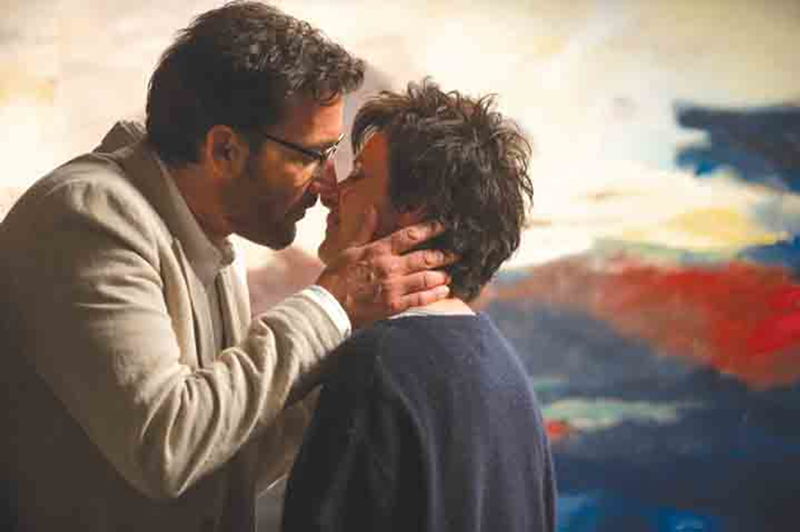Back in the early aughts, Clive Owen starred in a series of promotional online shorts created by BMW called The Hire, where he played a mysterious driver with no name enlisted by powerful people to tackle jobs that required a certain skill set, particularly behind the wheel, that only he had. Imagine one part James Bond mixed with The Transporter, which was somewhat fitting — thanks to his appearance in these spots, Owen almost snagged the coveted role as the super spy, losing out to Daniel Craig in a bid to replace Pierce Brosnan.
There’s a curious line uttered in one of those shorts that came to mind as I watched Owen essaying his way through Fred Schepisi’s new film, Words and Pictures. “Words,” a disgruntled executive (Maury Chaykin) claims, “Words are cheap. Words come and go. All I wanted from her was a gesture.” Of course, the man has kidnapped his former boss and sometime mistress (Kathryn Morris), locked her in the trunk of a beat-up car, driven said car into the ocean and asked for a seven-figure ransom. In the BMW short by director John Woo, Owen, as the driver, stands by and silently assesses the situation, his smoldering heroic good looks on standby waiting to kick into gear. Words, for that character, are beside the point, but that’s a rare exception in the case of Owen.
As a performer, Owen works best when words spew forth. Language rolls off his tongue, doused in that syrupy sweet accent of his, deliciously teasing our sensibilities. Often, you find it difficult in film to catch hold of the lilt or slur of an actor’s brogue; it can be a tough bit of gristle to bite into, but in Owen’s case, all of that melts away. We understand him because he seems able to marinate the lines internally, spicing them up just right before artfully laying them on us.
He is such an obvious choice, then, to serve as Jack Marcus, English teacher at a prestigious prep school and former celebrated author and poet, a man of letters and plagued by personal demons. Blocked by the white pages before him, unable to free himself with spirits, he is roguishly charming to the adoring students hanging on his every pronouncement in the classroom. And why wouldn’t the students and, by extension, the audience not be swayed — Owen casts quite a spell with those words of his.
The counter, though, is equally alluring. Juliette Binoche, as Roger Ebert stated long ago, was “almost ethereal in her beauty and innocence” when she attracted attention with The Unbearable Lightness of Being in 1988, but after shedding the innocence a few years later for Damage before claiming a Best Supporting Oscar for The English Patient in 1996, her beauty is now tinged with an infinite sadness that only deepens as the camera circles her, seeking that lost perceived perfection. Onscreen, she is the living equivalent of the Mona Lisa’s smile.
My personal favorite performance from the Binoche filmography would most likely be her leading role in Krzysztof Kieslowski’s Blue, where, as a woman wracked with grief over the loss of her husband and child in a car accident, she seeks to seal herself off from the world. Binoche embraces silence for much of the film, only to be awakened and renewed by music. It is no surprise to see her now as Dina Delsanto, an art teacher struggling with the debilitating effects of rheumatoid arthritis on her career and her life. Delsanto would be willing to retreat from the world and the decimation of her talents brought on by illness, but Jack Marcus looms, taunting her from the moment she is introduced as a new faculty recruit like a schoolboy in love.
And so it goes, the interplay between Jack Marcus and Dina Delsanto, Owen and Binoche, and it is quite lovely to watch the two of them — characters and actors — lunge and parry away at one another, tempting and teasing in a contest that Schepisi (Roxanne, Six Degrees of Separation) wants us to believe is chess for adults, a grown-up game during the barren summer season of mindlessness, but the results are not all complex and engaging. There is only so much these two can do to dress up the rote romantic moves, the “surprising” revelations of character flaws right on cue. Words and Pictures is checkers, minus the flying kings maybe, played by a masterful duo, but in the end, who really enjoys watching such a simple game? (Opens Friday at Esquire and Mariemont theatres) (PG-13) Grade: C+
CONTACT TT STERN-ENZI: [email protected]






